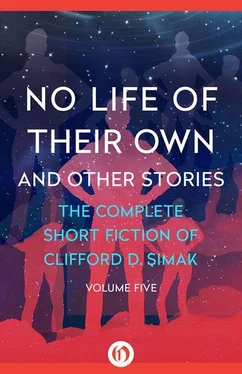“Had you called earlier, sir?” he asked.
Webster shook his head.
“I was afraid you might have,” Jenkins explained, “and wondered why I didn’t come. There was a most extraordinary occurrence, sir. Two men came with a ship and said they wanted you to go to Mars.”
“They are here,” said Webster. “Why didn’t you call me?”
He struggled to his feet.
“I didn’t think, sir,” said Jenkins, “that you would want to be bothered. It was so preposterous.”
Webster stiffened, felt chill fear gripping at his heart. Hands groping for the edge of the desk, he sat down in the chair, sensed the walls of the room closing in about him, a trap that would never let him go.
“I had a rather strenuous time, sir,” said Jenkins. “They were so insistent that finally, much as I disliked it, I resorted to force. But I finally persuaded them you never went anywhere.”
“To Walk a City’s Street” was originally written for the anthology Infinity Three , which was published in 1972 by Lancer Books. For some reason, the story has not appeared in print very often. Its greatest implausibility involves members of Congress not seeking control of Ernie’s mutant powers. Too bad.
—dww
Joe stopped the car.
“You know what to do,” he said.
“I walk down the street,” said Ernie. “I don’t do nothing. I walk until someone tells me it is time to stop. You got the other fellows out there?”
“We have the fellows out there.”
“Why couldn’t I just go alone?”
“You’d run away,” said Joe. “We tried you once before.”
“I wouldn’t run away again.”
“The hell you wouldn’t.”
“I don’t like this job,” said Ernie.
“It’s a good job. You don’t have to do anything. You just walk down the street.”
“But you say which street. I don’t get a pick of streets.”
“What difference does it make what streets you walk?”
“I can’t do anything I want, that’s the difference that it makes. I can’t even walk where I want to walk.”
“Where would you want to walk?”
“I don’t know,” said Ernie. “Any place you weren’t watching me. It used to be different. I could do what I wanted.”
“You’re eating regular now,” said Joe. “Drinking regular, too. You have a place to sleep each night. You got money in your pocket. You have money in the bank.”
“It don’t seem right,” said Ernie.
“Look, what’s the matter with you? Don’t you want to help people?”
“I ain’t got no beef against helping people. But how do I know I help them? I only got your say-so. You and that fellow back in Washington.”
“He explained it to you.”
“A lot of words. I don’t understand what he tells me. I’m not sure I believe what he tells me.”
“I don’t understand it, either,” said Joe, “but I have seen the figures.”
“I wouldn’t know even if I seen the figures.”
“Are you going to get started? Do I have to push you out?”
“No, I’ll get out by myself. How far you want I should walk?”
“We’ll tell you when to stop.”
“And you’ll be watching me.”
“You’re damned right we will,” said Joe.
“This ain’t a nice part of town. Why do I always have to walk the crummy parts of all these crummy towns?”
“It’s your part of town. It’s the kind of place you lived before we found you. You wouldn’t be happy in any other part of town.”
“But I had friends back there where you found me. There was Susie and Jake and Joseph, the Baboon and all the other people. Why can’t I ever go back and see my friends?”
“Because you’d talk. You’d shoot off your mouth.”
“You don’t trust me.”
“Should we trust you, Ernie?”
“No, I guess not,” said Ernie.
He got out of the car.
“But I was happy, see?” he said.
“Sure, sure,” said Joe. “I know.”
There was one man sitting at the bar and two sitting at a table in the back. The place reminded Ernie of the place where he and Susie and Joseph, the Baboon, and sometimes Jake and Harry used to spend an evening drinking beer. He climbed up on a stool. He felt comfortable and almost as if he were back in the good old days again.
“Give me a shot,” he said to the bartender.
“You got money, friend?”
“Sure, I got money.” Ernie laid a dollar on the bar. The bartender got a bottle and poured a drink. Ernie gulped it down. “Another one,” he said. The man poured another one.
“You’re a new one,” the bartender said.
“I ain’t been around before,” said Ernie.
He got a third drink and sat quietly, sipping it instead of throwing it right down.
“You know what I do?” he asked the bartender.
“Naw, I don’t know what you do. You do like all the rest of them. You don’t do nothing.”
“I cure people.”
“Is that so?”
“I walk around and I cure people when I walk.”
“Well, great,” said the bartender. “I got the beginning of a cold. So cure me.”
“You’re already cured,” said Ernie.
“I don’t feel no different than when you walked in here.”
“Tomorrow. You’ll be all right tomorrow. It takes a little time.”
“I ain’t going to pay you,” said the bartender.
“I don’t expect no pay. Other people pay me.”
“What other people?”
“Just other people. I don’t know who they are.”
“They must be nuts.”
“They won’t let me go home,” said Ernie.
“Well, now, ain’t that too bad.”
“I had a lot of friends. I had Susie and Joseph, the Baboon—”
“Everyone got friends,” the bartender said.
“I got an aura. That is what they think.”
“You got a what?”
“An aura. That is what they call it.”
“Never heard of it. You want another drink?”
“Yeah, give me another one. Then I got to go.”
Charley was standing on the sidewalk outside the joint, looking in at him. He didn’t want Charley walking in and saying something to him, like get going. It would be embarrassing.
He saw the sign in an upstairs window and darted up the stairs. Jack was across the street and Al just a block or so ahead. They would see him and come running, but maybe he could get to the office before they caught up with him.
The sign on the door said: Lawson & Cramer, Attorneys-at-Law. He moved in fast.
“I got to see a lawyer,” he told the receptionist.
“Have you an appointment, sir?”
“No, I ain’t got no appointment. But I need a lawyer quick. And I got money, see.”
He brought out a handful of crumpled bills.
“Mr. Cramer is busy.”
“What about the other one? Is he busy, too?”
“There isn’t any other lawyer. There used to be—”
“Look, lady, I can’t fool around.”
The door to the inner office came open and a man stood in it.
“What’s going on out here?”
“This gentleman—”
“I ain’t no gentleman,” said Ernie. “But I need a lawyer.”
“All right,” said the man. “Come in.”
“You’re Cramer?”
“Yes, I am.”
“You’ll help me?”
“I’ll try.”
The man closed the door and went around the desk and sat down.
“Have a chair,” he said. “What is your name?”
“Ernie Foss.”
The man wrote on a yellow pad.
“Ernie. That would be Ernest, would it?”
“Yeah, that’s right.”
“Your address, Mr. Foss.”
“I ain’t got no address. I just travel around. Once I had an address. I had friends. Susie and Joseph, the Baboon, and—”
Читать дальше












